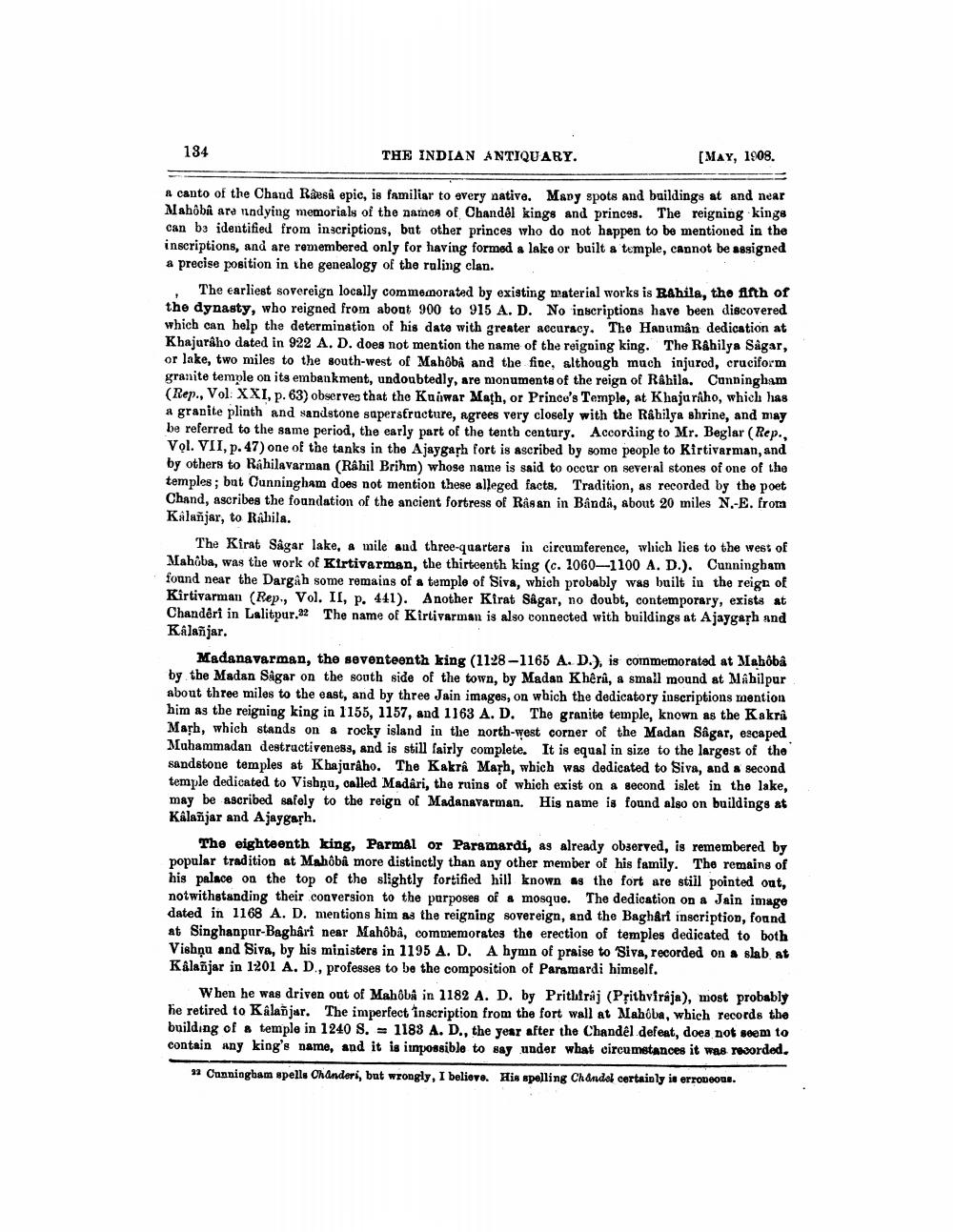________________
134
THE INDIAN ANTIQUARY.
[MAY, 1908.
A canto of the Chand Raesi epic, is familiar to every native. Mapy spots and buildings at and near Mahobî ara nndying memorials of the names of Chandel kings and priness. The reigning kings can bs identified from inscriptions, but other princes who do not happen to be mentioned in the inscriptions, and are remembered only for having formed a lake or built a temple, cannot be assigned a precise position in the genealogy of the ruling clan.
The earliest sovereign locally commemorated by existing material works is RAhila, the fifth of the dynasty, who reigned from about 900 to 915 A. D. No inscriptions have been discovered which can help the determination of his date with greater accuracy, The Hanuman dedication at Khajuraho dated in 922 A. D. does not mention the name of the reigning king. The Rahilya Sågar, or lake, two miles to the south-west of Mahoba and the five, although much injured, cruciform granite temple on its embankment, undoubtedly, are monumente of the reign of Râhila. Cunningham (Rep., Vol. XXI, p. 63) observes that the Kulwar Math, or Prince's Temple, at Khajuraho, which has a granite plinth and sandstone saperstructure, Agrees very closely with the Râhilya shrine, and may be referred to the same period, the early part of the tenth century. According to Mr. Beglar (Rep., Vol. VII, p. 47) one of the tanks in the Ajaygarh fort is ascribed by some people to Kirtivarman, and by others to Rahilavarman (Râhil Brihm) whose name is said to occur on several stones of one of the temples; but Cunningham does not mention these alleged facts. Tradition, as recorded by the poet Chand, ascribes the foundation of the ancient fortress of Risan in Banda, about 20 miles N.-E. from Kalañjar, to Rahila.
The Kirat Sågar lake, a mile and three-quarters in circumference, which lies to the west of Mahâba, was the work of Kirtivarman, the thirteenth king (c. 2060-1100 A. D.). Cunningham found near the Dargah some remains of a temple of Siva, which probably was built in the reign of Kirtivarman (Rep., Vol. II, p. 441). Another Kirat Sagar, no doubt, contemporary, exists at Chanderi in Lalitpur.32 The name of Kirtivarman is also connected with buildings at Ajaygesh and KAlañjar.
Madanavarman, the seventeenth king (1128-1165 A. D.), is commemorated at Mabôbâ by the Madan Sagar on the south side of the town, by Madan Khêri, a small mound at Mabilpur about three miles to the east, and by three Jain images, on which the dedicatory inscriptions mention him as the reigning king in 1155, 1157, and 1163 A. D. The granite temple, known as the Kakra Mash, which stands on a rocky island in the north-west corner of the Madan Sâgar, escaped Muhammadan destractiveness, and is still fairly complete. It is equal in size to the largest of the sandstone temples at Khajuraho. The Kakra Marh, which was dedicated to Siva, and a second temple dedicated to Vishnu, called Madari, the ruins of which exist on a second islet in the lake, may be ascribed safely to the reign of Madanaparman. His name is found also on buildings at Kålažjar and Ajaygash.
The eighteenth king, Parmal or Paramardi, as already observed, is remembered by popular tradition at Mahôbê more distinctly than any other member of his family. The remains of his palace on the top of the slightly fortified hill known as the fort are still pointed out, notwithstanding their conversion to the purposes of a mosque. The dedication on a Jain image dated in 1168 A. D. mentions him as the reigning sovereign, and the Baghari inscription, found at Singhanpur-Baghari near Mahôbâ, commemorates the erection of temples dedicated to both Vishņu and Siva, by his ministers in 1195 A. D. A hymn of praise to 'Siva, recorded on a slab at Kalajar in 1201 A. D., professes to be the composition of Paramardi himself.
When he was driven out of Mahoba in 1182 A. D. by Prithiraj (Prithviraja), most probably he retired to Kalaõjar. The imperfect inscription from the fort wall at Mahóba, which records the building of a temple in 1240 S. - 1188 A. D., the year after the Chandel defeat, does not seem to contain any king's name, and it is impossible to say under what circumstances it was recorded.
12 Cunningham spells Chanderi, but wrongly, I believe. His spelling Chandol certainly in erroneous.




